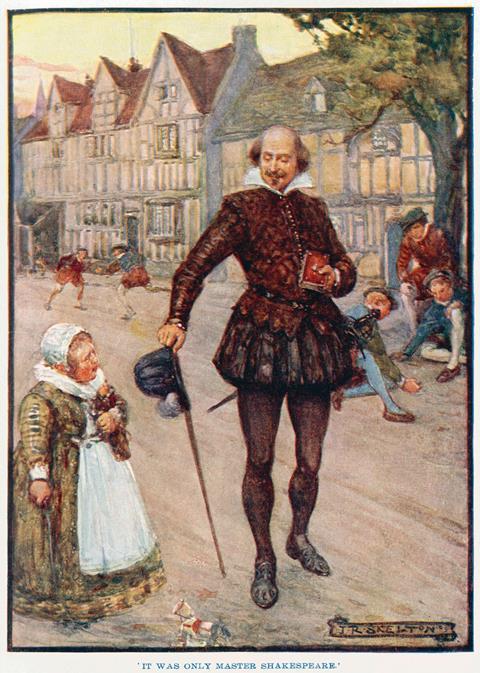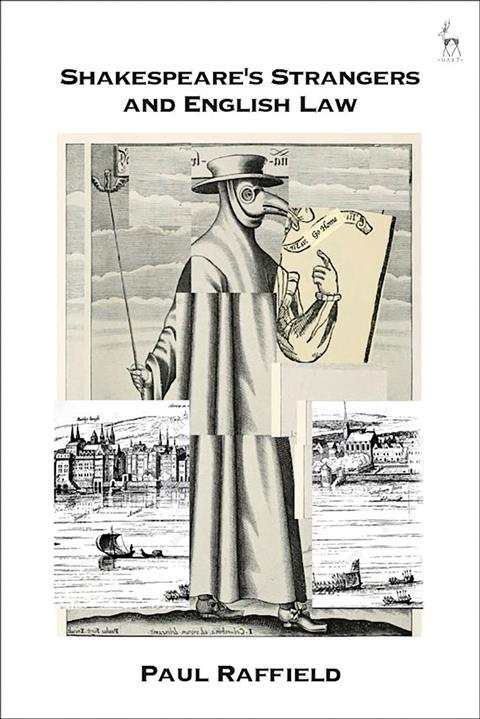Behind our own legal mask
Shakespeare’s Strangers and English Law
Paul Raffield
£85, Hart Publishing
★★★★★
It is the mark of a book that makes the reader want to go back to the beginning when that last sentence is reached.
To discover other books by the same author. To return to the source material. In this instance I shall do all three. The third being, in my sixth age (having shuffled ‘into the lean and slippered pantaloon’), a return to Shakespeare.

I was reviewing this book on a recent journey across London.
I was travelling from domus to domus – from Saaf of the Thames to Gray’s Inn Library where I have rights – permissions to study and dine. Latterly, as a respite to WFH, to write and quaff. After a life of leaping and drifting, I return to a space/place of a certain belonging or authenticity or arrival (and to know the space/place for the first time).
On my journey (listening to Will’s contemporary namesake Byrd) I was a lawyer among strangers. A strange lawyer perhaps, part Pericles, part Plumber (with a tool-bag getting law jobs done). And in my tool-bag, the baggage – the detritus of my life in/for the law.
On my journey I noted the gradual return of the mark of public reckoning of a private appraisal of risk/harm – the blue face mask of the pox of pandemic – the Co(r)vid Covering.
As we trundled above and below the sub-urban forgotten burial grounds of plague and the sites of play and pleasure houses, I sat with the other strangers – the City/shop workers, those who procure and offer services, and the beggars and the refugees with ‘No Recourse to Public Funds’, that rattle bag of the crowd post-Brexit, the inheritors/shadows of Shakespeare’s (Merrie) England of ancient myth and Continental/Classical influence.
My alma mater is the School of Law of Warwick University (Ltd). I arrived there because it was near both my childhood home and the Royal Shakespeare Company permanently camped on Shakespeare’s Birthplace (PLC).
I had gained admission to the Door of the Law. The price of entry was a study of Cymbeline (RSC Production 1979). Today I would elect to study Module LA392 ‘Shakespeare and Law’.
For that achievement alone I would commend actor-lawyer-scholar Paul Raffield – let alone this remarkable feat of scholarship of which marks the point of trilogy and a unique contribution to both legal and Shakespearian studies.

And that is on my reading of the third volume alone.
I have been in and out of the Door of the Law since. Which makes my reading of Shakespeare’s Strangers and English Law possibly validating and comforting to me and, I hope to venture, to others in this profession where the mirror between legal practice and the artifice of the actor are oft reflected – and not just in the revelries of Gray’s Inn, a wet Thursday at Grantham Mags, by way of a video-link ‘with’ a detainee in an immigration removal centre (the artifice of ‘reception’ long abandoned), or before the LCJ at the RCJ.
Shakespeare, which is why the work is still within the contested ‘canon’ – as read by Raffield – illustrates aspects of the world of law as relevant and compelling to his world then and our world now, an encompassed world of fear – fear of the stranger and the plague, between Brexit and Covid-19, and of the unconstitutional proclamations seeking to outlaw both. Raffield makes this point in his rueful Afterword, bringing together for today his themes drawn from his analysis of the plays of then.
The author notes in his introduction, which is also in part a gentle autobiographical digression: ‘While my last two monographs have been concerned with the performance of law in the Elizabethan and Jacobean playhouses, this project focuses the theme of “theatre of law” in a new direction, viewing law and its presentation in early modern playhouses from the perspective of the stranger.’
The stranger as the anti-body to be feared as by nature the transgressor, the out-law.
The body of this work extrapolates the figure of the stranger as transgressor in different disguises: the forger/counterfeiter (of the sovereign coinage), the bawd/fornicator of pestilence in Measure for Measure; the foreigner (particularly the French) in the Comedy of Errors; and more foreigners (beware Greeks bearing gifts) as marketeers along the South Bank ‘Troy Novant’ in Troilus and Cressida; and ever the Jew as Other in The Merchant of Venice, and – as a pandemic/Brexit coda – the legal foundation of identity, in a headless-state, the constitution sick with unknowing and the sorrows of the broken contracts and where we were all strangers in the Country near Dover, between two camps (the French, again) – King Lear.
For our strange times, Raffield offers we practitioners of the law a refreshing perspective on what we thought we might know (not least about Shakespeare) about law in our times and ourselves sitting reasonably on the Clapham omnibus (Raffield should have a Blue Plaque) as one among strangers behind our own legal mask.
Christopher Stanley is a litigation consultant at KRW Law, Belfast and London































No comments yet